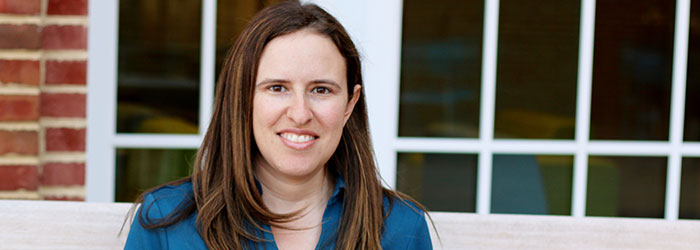By John DiConsiglio
Cassandra Good, BA ’04, MA ’05, couldn’t believe her luck. While researching her American Studies senior thesis in 2004, she stumbled upon an 1809 letter written to Thomas Jefferson’s sister from Washington socialite Margaret Bayard Smith. Jefferson was leaving the capital, retiring from public life for his home in Monticello. But Smith’s letter didn’t read like a simple goodbye. In flushed detail, she described catching sight of Jefferson across a crowded hall at his farewell reception. Her heart beat wildly. She could barely contain her excitement as he walked toward her. They held hands for several breathless minutes. Even recalling the evening in her letter filled her with such a rush of emotions that she had difficulty writing through her tears.
Good was stunned. Had she just uncovered a salacious footnote in early American history? Was Jefferson having an affair with the married Smith?
Today, Good, an accomplished historian, chuckled at her an undergraduate enthusiasm. She recalled rushing to reveal her discovery to her faculty advisor, Professor of American Studies Terry Murphy. Sorry, Murphy informed the eager student. The romantic flourish of Smith’s letter was just a common means of expression at the time. The letter didn’t prove that Jefferson and Smith were lovers. It just showed that they were close friends.
“I found that answer equally as compelling,” Good said. “How could these men and women be friends without people assuming the relationship was romantic?”
That quandary lingered with Good as she graduated with Columbian College’s first ever combined BA/MA in American Studies. It followed her through her first job with the Smithsonian and to her current position at the University of Mary Washington as editor of the Papers of James Monroe project. Good spent a decade traveling to dozens of archives and museums, scouring through early American letters and diaries, all in search of an answer to that nagging question.
“How did they make this work?” she said. “It’s complicated enough in the 21st century to have male-female friendships. How, given the period’s restrictions on women and the risks to their reputation, could a married woman write a letter like that to a single man?”
|
Founding Friendships: Friendships Between Men and Women in the Early American Republic (Oxford University Press, 2015) |
Good’s intellectual obsession paid off with her first book, Founding Friendships: Friendships Between Men and Women in the Early American Republic (Oxford University Press, 2015), a detailed examination of friendships between men and women from 1780 to 1830.
Using historical examples like the close relationship between Jefferson and Abigail Adams, Good argues that, despite the risk of gossipy whispers and accusations of impropriety, friendships between men and women were not only possible but common—and quintessentially American. “Elite men and women formed loving friendships that exemplified the key values of the new nation: equality, virtue, freedom and choice,” Good writes in Founding Friendships. “These friendships were building blocks of American systems of politics, gender and power.”
For example, when Good first examined the letters between Jefferson and Abigail Adams, they appeared to hint at a more-than-friendly acquaintance between the Declaration of Independence author and the wife of his friend and sometime rival John Adams. Abigail praised him as “one of the choice ones on earth.” He compared her to a goddess. The pair were inseparable in Paris where Jefferson resided after his wife’s death in 1782. They attended the theater and dinner parties together—sometimes with John Adams, often without.
“They had a very affectionate relationship,” Good noted. “They bonded quickly. She was smart, well-read and politically astute. He got along well with women. His letters to women like Abigail are warm and playful. It’s hard not to like him.”
The emotionally rich language of their letters is seemingly effusive to modern readers. But it was fairly tame for the time, Good discovered. Hunting through archives of correspondences, Good compared the era’s friendship letters to true courtship notes. Friendly letters assiduously avoided romantic buzzwords like “heart” and “love.” Jefferson always addressed his letters to “Dear Madam,” instead of using Abigail’s first name. “First names were a tip-off to a romance,” Good said.
With watchful eyes always searching for signs of an illicit affair, Jefferson and Abigail were careful to follow the era’s underwritten etiquette. Jefferson unfailingly included John Adams as the third leg in the relationship stool. He asked permission from Adams to write his wife; often he addressed his letters to both of them. Without the implied approval of her spouse, Good said that even a woman as renowned as Abigail Adams courted scandal. “For a woman, especially if she was unmarried, gossip could be very serious,” she explained. “You could lose your reputation, and your ability to be married and provided for. That’s everything to you.”
Despite the risks, the frequency of male-female friendships offers insights into the ideals of the burgeoning nation. Gender roles were flexible. Freedom of choice—whether picking your leaders or your friends—was valued. And, as Good stresses in her book, women’s voices were major influences in shaping American history. “We often look at men’s historical narratives and women’s like they are two separate stories,” she said. “But all those voices—voices of gender, race, class—are intertwined. They are all fundamental to building the story of America.”
For her next project, Good is exploring the lives of George Washington’s descendants. “They were the first First Family in a country terrified of monarchy” she said. She’s prepared for more nights and weekends huddled in the vaults of the National Archives and the stacks of the Library of Congress. But Good attributes her passion for research—or “detective work,” as she sometimes thinks of it—to her GW studies. “The idea of looking at a cultural phenomenon through many types of sources—literature, art, letters—came out of my training in the American Studies program,” she said. “My professors encouraged me to think creatively and test out new ideas.”



